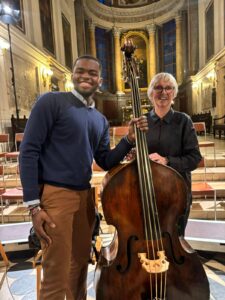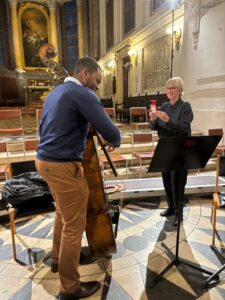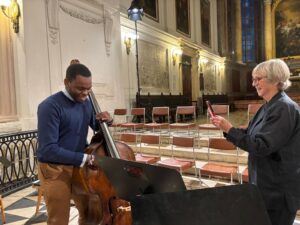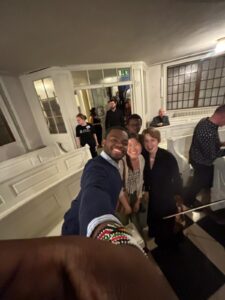This past Saturday was one of the most meaningful days of my time in Leipzig so far. With Princeton, I had the opportunity to attend a performance of three Bach cantatas at St. Nikolai Church — the same church where Bach once served as music director. Even more surreal was the fact that the concert was conducted by Sir John Eliot Gardiner, someone I’ve admired deeply as a baroque conductor for years. Hearing his interpretation of Bach’s music in that historical setting was truly unforgettable.




After the concert, I had a conversation with the bassist from the orchestra, and what followed was something I never imagined would happen: she handed me her instrument and invited me to play it. It was an incredibly generous gesture — and one that meant the world to me.

What I didn’t realize at first was just how special that bass was. She told me it was 356 years old — even older than the average Stradivarius — and had been used to perform Bach’s cantatas and orchestral suites during his lifetime, when he was music director at St. Nikolai. It’s very likely that Bach not only saw this bass, but also heard it in the very works he composed. I was completely stunned.

At Princeton, I’m not even allowed to touch the original manuscript of BWV 33 — and yet here I was, unsupervised, holding and playing an instrument that once existed in Bach’s sound world. It was a moment that reminded me why I chose to study this music in the first place.

Later, I met Jenna, a violinist in the ensemble who also happens to be from the U.S., and coincidentally from the South, like me. Talking with her about life as a professional baroque musician was incredibly inspiring. She reminded me that pursuing a life in music — especially early music — is not only possible, but full of joy, curiosity, and community.

To end the evening, I had a slice of cake and an impromptu grammar lesson from Professor Rankin. His explanation of several German language points helped clarify things I had been struggling with all week. Learning German has not been easy, but I’m so grateful to have support from the Princeton German Department while I’m here — it makes all the difference.
I left the day feeling energized and thankful. So much so, in fact, that I decided to arrange a short excerpt from the third movement of Brandenburg Concerto No. 6 — just as a small way of reflecting on the joy I felt.
What a great experience — and thanks for the Brandenburg! I think one of the wonderful things about this festival is how easy it is to meet the musicians and how the energy is so positive. I’m so glad you’ve had a chance to interact with all these amazing musicians (and work on German!)